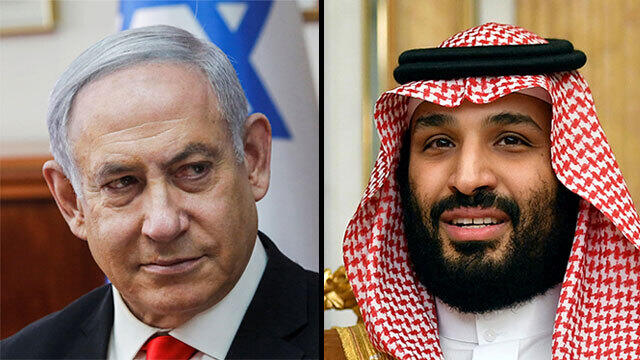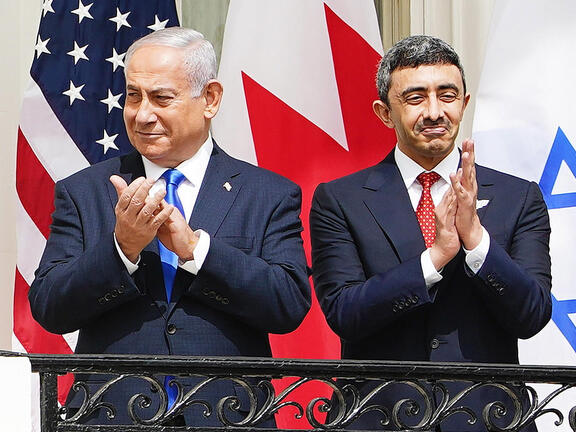Getting your Trinity Audio player ready...
Prime Minister Benjamin Netanyahu may meet with Saudi Crown Prince Mohammed bin Salman during his visit Thursday to the United Arab Emirates, Israeli public broadcaster Kan reported Wednesday.
The report was not immediately confirmed by Netanyahu's office or by the UAE.
3 View gallery


Prime Minister Benjamin Netanyahu and Saudi Crown Prince Mohammed bin Salman
(Photos: GPO, Reuters)
Kan said he would hold talks with Abu Dhabi's Crown Prince Sheikh Mohammed bin Zayed al-Nahyan and that bin Salman might join them.
If it goes ahead, the meeting would not be the first between the Israeli and Saudi leaders. Netanyahu made a secret trip to Saudi Arabia for talks with bin Salman in November 2020.
The prime minister was accompanied by Mossad Director Yossi Cohen, while then-U.S. secretary of State Mike Pompeo also attended the meeting.
A Saudi official source on Wednesday denied that bin Salman would be meeting with Netanyahu, saying that the prince would not be visiting the UAE the day after.
Netanyahu's planned trip to the UAE was postponed last month due to the coronavirus pandemic. Sources said that the Gulf kingdom was worried about the visit's proximity to Israel's March 23 election, but were eventually persuaded.
None of Israel's airlines - El Al, Israir or Arkia - were invited to transport the prime minister to the UAE and it was unclear how he will make his way to Abu Dhabi.
3 View gallery


Prime Minister Benjamin Netanyahu and UAE Foreign Minister Abdullah bin Zayed Al-Nahyan at the White House to sign the Abraham Accords, Sept. 2020
(Photo: AP)
Israel established formal relations with the UAE and Bahrain last September - only its third and fourth normalization deals with Arab states in over 70 years - as part of a U.S.-brokered agreement. The three countries share common concerns about Iran.
Saudi Arabia, a Gulf powerhouse and Islam's birthplace, encouraged the rapprochement but has stopped short of recognizing Israel itself.
It was not immediately clear if Netanyahu, on what Israeli media said would be a one-day visit, would also go to Bahrain, as he had planned to do during a previously scheduled one-day trip to the Gulf in February which he postponed due to the coronavirus crisis.
Netanyahu, largely running in politically polarized Israel's fourth election in two years on his role in its rapid COVID-19 vaccination program, has also made his drive to forge new relations in the Gulf region a centerpiece of his campaign.
Israeli tourists and business executives flocked to the UAE before a national lockdown in Israel largely closed Ben-Gurion International Airport in late January. Restrictions were eased on Sunday.
In an interview with Army Radio on Tuesday, Netanyahu called on voters to re-elect him on March 23 so that he could achieve "more peace agreements" in the area, while ensuring that Iran "doesn't arm itself with nuclear weapons."
Iran denies its nuclear program is aimed at developing atomic weaponry.


